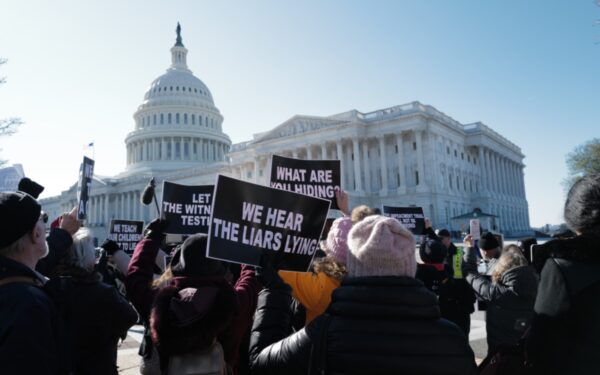Michael Flynn is out. After an intensifying scandal over his contact with Russian officials, Trump’s national security adviser resigned on Monday night amidst a flurry of shock revelations.
Flynn’s crime was talking about US sanctions on Russia with the Russian ambassador, and then lying about it. This has been bubbling for a while. The sanctions were imposed by President Obama after intelligence reports that Russian hackers had interfered in the US presidential election, and that the Kremlin had been involved. The rumours that Flynn discussed lifting the sanctions in a conversation with the Russian Ambassador Sergey Kislyak began in January, before the inauguration. Both Flynn and the White House adamantly denied this allegation, both at the time and subsequently. Most importantly, Vice President Mike Pence went on the record to defend Flynn and reiterate that sanctions categorically had not come up in the conversation with Kislyak.
It has since transpired that Pence based his support of Flynn not on any hard evidence, but simply on what Flynn had told him. And Flynn lied. That lie has been unravelling for the last few days as more officials anonymously came forward. On Thursday, Flynn’s spokesman amended the national security adviser’s line, telling the Washington Post that Flynn “couldn’t be certain that the topic never came up”. Over the weekend, it became clear that this was an understatement.
Pence is apparently furious to have been misled, and there are indications that it was this betrayal, rather than the conversation itself, that ended Flynn’s short-lived White House career. In his resignation letter, he skirts over the very real and very serious concerns that recklessly risked compromising America’s stance on Russia, focussing instead on what he told Pence:
“In the course of my duties as the incoming National Security Advisor, I held numerous phone calls with foreign counterparts, ministers, and ambassadors. These calls were to facilitate a smooth transition and begin to build the necessary relationships between the President, his advisors and foreign leaders. Such calls are standard practice in any transition of this magnitude.
I inadvertently briefed the Vice President Elect and others with incomplete information regarding my phone calls with the Russian Ambassador. I have sincerely apologized to the President and the Vice President, and they have accepted my apology.”
There are several crucial things to note about this saga.
The first is that the White House did not seem to have a clue how to handle Flynn’s conduct. There is a transcript of the call, which federal officials have now read, making Flynn’s repeated insistence that he did not discuss sanctions at all seem bizarre. Even stranger is why Pence would defend Flynn without having seen the transcripts first. Meanwhile officials have confirmed that it is impossible to know whether other members of the Trump transition team were aware what Flynn was doing, meaning there could be people in the White House who knew Flynn was lying.
It has also emerged that the acting attorney general at the time, Sally Yates, was not convinced by Flynn’s account of his conversation with the ambassador. She informed the White House and warned them that Flynn’s conduct might make him vulnerable to Russian blackmail, in addition to the concerns that his conduct might actually be illegal. (The Logan Act bars private US citizens from getting involved in disputes involving foreign governments – a statute Flynn may have broken.) It is not clear what action was taken as a result of Yates’ warning.
It has been less than a month since Trump took office, and already his administration has made it clear it has no issue with lying to the public. His press secretary’s first press briefing, the day after the inauguration, was arranged for the explicit purpose of lying to the media about the size of the inauguration crowd. Since then, we have heard a plethora of “alternative facts”, from massacres that didn’t happen to false accusations of the press coverage of terrorist attacks. In that context, Flynn’s dishonest claims that he did not discuss sanctions do not seem that shocking. (Incidentally, “I inadvertently briefed the Vice President Elect and others with incomplete information” should go down as a textbook excuse for being caught out in a blatant lie.)
What is striking is that in this instance it backfired. There was no Kellyanne Conway leaping to his defence on cable news to spin an alternative scenario whereby Flynn was actually being tough on Russia. Blustering accusations of “fake news” and the “dishonest media” have been notably absent. It’s not that the Trump team couldn’t have defended Flynn – they chose not to. Why? Flynn has been a longterm Trump ally, and was one of the first military officers to publicly support him back in the primaries. His recklessness was well-known at the time. His career as Director of the Defense Intelligence Agency ended abruptly in 2014, thanks to his disruptive management style and his aggressive mistrust of the intelligence communities. He led the chants of “Lock her up” at the Republican National Convention in 2016, and once said that fear of Muslims was “rational”. It is not news that Flynn is a loose cannon. What is news is the White House abandoning him for it.
That implies that the Trump team’s house of cards may be trembling. Already there are reports of power struggles between Steve Bannon and Jared Kushner, and the fall-out from the immigration ban is still sending shockwaves through what was never a cohesive team to begin with. Now Flynn has been forced out. Who will be next?



